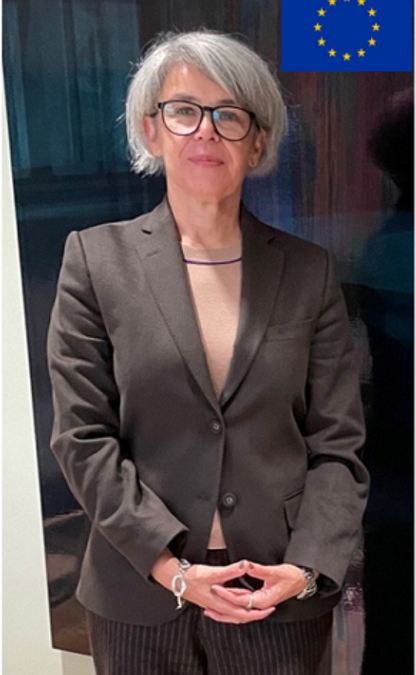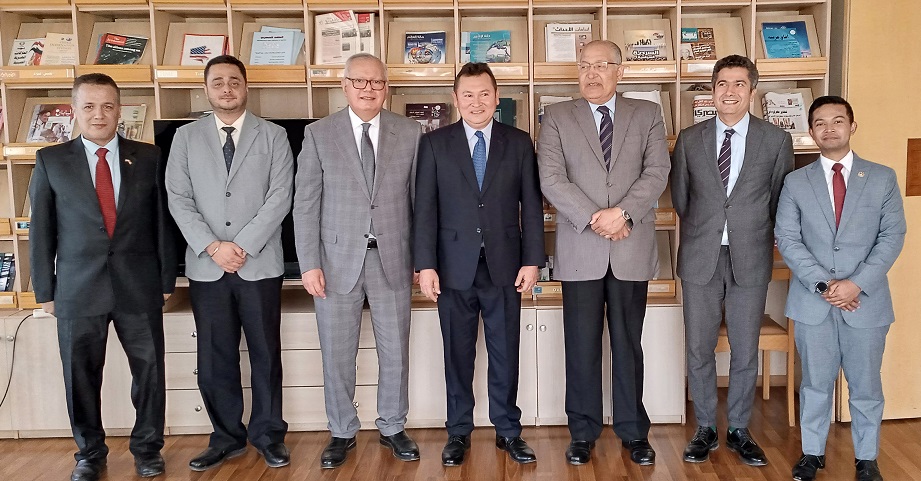Meeting of the German Ambassador to Cairo with ECFA members
November 30, 2022Participation of ECFA delegation in a press conference of the Chinese ambassador to Cairo on “Chinese / Arab Cooperation”
December 11, 2022
On December 4, 2022, Ambassador Ezzat Saad, ECFA Director, and Ambassador Marwan Badr, ECFA Coordinator of African Affairs, received Dr. Annette Weber, the European Union’s Special Envoy to the Horn of Africa, at the head of a delegation, which included Ms. Antonia Zafeiri, Head of the political and media department at the European Union Mission in Cairo, Mr. Fouad Hikmat, expert in crisis management and representative of the Office of the European Union Envoy to the Horn of Africa, and Ms. Isabelle Richard, Political Adviser at the Office of the Special Envoy to the Horn of Africa (Brussels Office).
Dr. Weber expressed her desire to get acquainted with ECFA’s vision of how to resolve the current stalemate in the Renaissance Dam issue, noting that Ethiopia is a major country in the region, just like Egypt, and that the European Union is interested in preserving the stability of this country, and that the Renaissance Dam has become a fait accompli, adding that she understood from the Sudanese that Ethiopia is sharing with them information about the operation of the Renaissance Dam, wondering whether the issue of the Ethiopian side’s sharing information with us could constitute a way out to resolve the Dam crisis, and that her contacts with the United Arab Emirates reflect “the Emiratis’ understanding of the situation,” and that they are “convinced that there is enormous economic potential from cooperating with the Ethiopian side.”
On the other hand, the two ECFA members presented an overview of the Council and its activities, as well as the water situation of Egypt, as it is among the worst in the world, as the Nile River represents 97% of its water resources, all of which come from outside the Egyptian borders. The ECFA members added that the problem of the West, including the Europeans, is that it does not want to understand the problem in this way. It is difficult to imagine the dispute as a water dispute at a time when approximately 7,300 billion cubic meters of water falls on the Nile Basin countries annually, with about 3,600 billion on the Congo, 1,000 billion on Tanzania, 900 billion on Ethiopia, 800 billion on South Sudan, and 365 billion on Kenya, 285 billion on Uganda, 240 billion on Sudan, 45 billion on Eritrea, and 35 billion on Rwanda, while only 1.3 billion cubic meters of water falls on Egypt. Therefore, it is inconceivable that the dispute revolves around 55.5 billion cubic meters of water only, which is the share of Egypt. It is also inconceivable that depriving Egypt of this share and distributing it to the basin countries will lead to a solution to the water problem facing these countries. It is also difficult to imagine that the dispute is a developmental dispute.
ECFA members also explained to the visiting delegation that President El-Sisi has adopted – since he took office- a different approach towards Ethiopia, as he initiated a visit to Addis Ababa, and addressed the Ethiopian Parliament, affirming Ethiopia’s right to development, and he also urged the business community in Egypt to invest in Ethiopia, which was what was actually realized, at significant rates, in the hope of building trust with the Ethiopian regime, but all these efforts, with their clear good intentions, did not change anything of the Ethiopians’ position. ECFA members also presented the outcomes of his visit to Ethiopia in November 2017, during which he discussed at length with his Ethiopian counterpart about bilateral relations and the various implications of the Renaissance Dam problem, stressing Egypt’s interest in starting a new phase of joint cooperation with Ethiopia, based on common interests and mutual benefits.
The meeting concluded by emphasizing that the optimal solution is the need for the European Union to make efforts to persuade Ethiopia to accept a binding legal framework for filling and operating the Dam, taking into account the interests of the three concerned parties. In this context, it was also emphasized that the European Union and the West in general have the tools to pressure Ethiopia to accept this solution, but we sense the lack of political will on both sides to do so.






